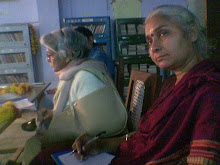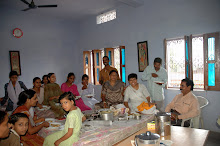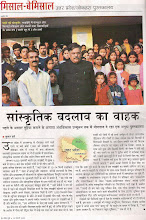The year 2007-08 has been quite spectacular for the organisation as lots of activities ranging from health care , women empowerment, capacity building and income generation to cultural mobilization kept the young and energetic team of the library busy through out the year. Following is the summary of activities-
Activities related to health and cleanliness :
Two retired CMOs of U.P.PMS , Dr. R.A.Mishra and Dr. Raja Ram provided free medical services to the villagers of the adjoining villages. Every month one of them visited the organisation , stayed there for two/three days and checked needy patients. Their visit proved of immense value to the poor people.
The organisation carried on the RCH programme in the Badrao Block of Mau district. More than five thousand families of the block were covered in this programme.Specially the children from 0-6 and young mothers were benifitted.Villages were sensitised on issues like immunization and nutritious food to the pregnant and children.
Regular awareness programmes were organised on AIDS. Volunteers from the organisation went to the near by Dhabas and tried to educate truckers on issues related to AIDS. Poster and painting competitions were organised for the school children.
Activities related to skill up gradation and income generation :
The computer center run by the organisation expanded its activities both in terms of quantity and quality. Four more computers were acquired this year and average strength of the classes remained more than fifty. Similarly the typing training facility attracted large no of boys and girls of adjoining areas. Local women took full advantage of the sewing and tailoring training center where new machines were added this year. An old car was donated by a well wisher this year and with this the organisation started a motor driving school where local boys are learning motor driving at a very nominal fees. Another spectacular achievement was tie up with two prestigious institutions for skill up gradation and income generation. School of Management and Retail Training (SMART) Varanasi entered into a formal agreement with SRSP and have started imparting training in the field of retail trading. It is expected that after completing training these boys and girls will find suitable placements in the fast increasing retail sector. Kala Gao , a well known center of ethnic art and craftsmanship in Lucknow , has trained and given designs to the women attached with our sewing center and has promised to market their produce. Results are awaited.
Cultural activities through out the year:
Whole year witnessed lots of activities in this area. More than seven hundred new books were added this year. With the financial support of Raja Ram Mohan Roy Library Trust Kolkata, a new wing for the children was opened. A two days national discourse on life and works of great Hindi poetess Mahadevi Verma was organised with the support of Sahitya Academy New Delhi on 27 and 28th 0f January 2007.A large number of writers and critics participated in it. A painting workshop was organised from18 to 25th of June. More than 30 boys and girls participated in this residential camp and learnt various aspects of painting. Three days workshop of writers for children was organised by National Book Trust, New Delhi from 29 to 31st of July 2, 2008 in which children's writers from all over the country participate , deliberated and interacted with child readers. A second workshop of the year on painting was again organised from 26 to 31st of December 2007 which again attracted large number of young participants and was a huge success.
Theatre, like previous years, was an activity which lasted the whole year. The drama repertory of the Library was invited by Pash Pustkalaya Karnal, Haryana and they performed in various district headquarters of Haryana. Bhartendu Natya Academy , Lucknow organised a theatre workshop from 20th May to 20th June 2007. 37 boys and girls from Azamgarh, Mau, Ghazipur. Jaunpur and Sultan participated in this residential production cum training workshop. The second theatre workshop was organised by National School of Drama, New Delhi, 20th December 2007 to 20th January 2008.Again it was a huge success and 43 participants from adjoining districts participated in it.
Sponsered by Sahitya Academy, New Delhi,a two days' seminar was organised on the occasion of birth centenary of the great Hindi writer Hazari Prasad Dwivedi on 29th and 30th of December. Large number of writers ,teachers and admirers of Hazari Prasad Dwivedi participated in it.
Other activities:
Throughout the year the organisation tried to sensitise the villagers on such issues like environment. water conservation, organic farming ,.Panchayati Raj ,RTI, Domestic Violence Act and NAREGA. Seminars, discussions and poster exhibitions supported by Nukkad Nataks were organised.The physical fitness programmes with the help of Volley Ball nursery run by the organisation continued the whole year.
sri ramanand saraswati pustkalaya
Subscribe to:
Post Comments (Atom)
Women dare to ask question:
The mundane and routine life of Prabhawati had always been on the receiving end. Poverty, ill treatment of in laws and regular beating by a drunkard husband Bhagwat were all she could remember till she met Kusum and Pushpa, two activists on gender issues. SRSP, with support of OXFAM, has initiated a campaign against gender violence in fifteen surrounding villages. Prabhawati's village Sahnupur is one among these. She learnt the art of protest during interaction with Kusum and Pushpa and that was the beginning of the end of accepting cruelty without asking questions. "How dare you ask question" was the reaction of Bhagwat, with a sense of disbelief on his face, one day when he slapped her and a defiant Prabhawati asked uncomfortable questions. Since then Prabhawati never looked back. She giggles while narrating, before women participants in a discourse on gender, how she reacts to the violent behaviour of her husband and how much he fears raising his hands on her because he knows that she will pay him back in the same coins. Prabhawati is one of many women of different age groups who regularly attend various capacity building programmes and discussions organised by SRSP. These exposures have taught them to ask questions and not to accept violence against them in different forms and at various levels.
Letters from a Goa prisoner to writers: Sumant Bhattacharya in Indian Express of 18 th January 1998
NEW DELHI, January 17: From his tiny cell in Goa's Central Jail, Sudhir Sharma, Inmate No 797, has been fighting a long and lonely battle: he wants to read. The Constitution and the Supreme Court say he has the right to do so, his prison authorities say no.Sharma, a former addict, was arrested in 1993 and sentenced to a 10-year jail term under the Narcotics Act. While in prison, one day, a fellow inmate showed him a copy of Pahal, a monthly Hindi literary magazine. It was this that, Sharma says, gave him a reason to live.
He wrote to Pahal editor, noted Hindi writer Gyanranjan, who sent him his books. They reached the jail but authorities said he couldn't read them. The books were sent back and Sharma was moved to a sub-jail, in Vasco, where, he says, the conditions are worse.
Still, he keeps writing letters, to Gyanranjan, Hindi novelist and DIG of Border Security Force, Vibhuti Narain Rai; authors Nirmal Varma, S R Yatri and Asghar Wajahat. These letters aren't sent through ``official channels'', he smuggles them out, sometimes through an inmate on his way to the hospital, a friendly warden or an inmate's relative. In his latest letter to Rai on December 10, 1997, Sharma says he's perhaps paying for raising his voice.
The story of his life, as told through his letters: Once a student of Delhi University, Sharma left home for Mumbai. He began working for the underworld don Karim Lala's nephew Samad Khan, fell in love with a ``penfriend'' from Jodhpur. Things changed when Samad Khan was killed and his girlfriend ditched him. Sharma became an addict and began to peddle drugs until he landed in jail.
He clocked his days in despair until he read Pahal. ``Pahal ke ank ne meri zindagi mein pranvayu ka sanchar kiya,'' he writes in a letter to Rai. (Just one issue of Pahal gave me a fresh lease of life). He goes on to thank Gyanda (Gyanranjan) for accepting a prisoner as a reader. ``Thank you for agreeing to share your books with a criminal. I know I have done something wrong but I am conscious. Don't I have the right,'' he asks, ``to know what's going on, to be sensitive?''
Books and magazines came pouring in which jail authorities confiscated. He also wrote to Kiran Bedi. In a letter, he says he believes that his persecution by the jailer was largely due to his attempt to spill the beans in the letter to Bedi.
The IG (Prison), Goa, and the superintendent of the Central Jail in Aguada, quoted the jail manual to justify their action. In a letter to Rai dated July 8, 1996, the superintendent says:
"In view of Rule 17 of the Goa Daman and Diu Prisons (Facilities to the prisoners) Rules 1968, the parcel which was sent by you was refused by this jail."
According to this rule, prisoners' mail, both incoming and outgoing, "shall be carefully censored." And a prisoner may be asked to give "a list of persons with whom he is likely to correspond during his period of imprisonment. As far as practicable, this list shall be scrutinised."
Jail authorities claim that since these authors' names don't figure in this list, he cannot receive anything from them.
This despite a 1979 ruling by a Supreme Court bench comprising Justices V R Krishna Iyer, R S Pathak and O Chinnappa Reddy. The judges had said: "No prisoner can be personally subjected to deprivations not necessitated by the fact of incarceration and the sentence of the court. All other freedoms belong to him, to read and write... to creative comforts... to movement within the prison campus subject to the requirements of discipline and security, to the minimal joy of self-expression, to acquire skills... all other fundamental rights tailored to the limitations of imprisonment."Speaking to The Indian Express, G H Kenaudekar, additional Deputy Collector and Deputy IG (Prison), Goa north, says: "As per rules, books will not be given to prisoners but will be kept with jail authorities." When told of the Supreme Court's ruling, he says that probably the jail administration is not aware of the decision.
Ironically, the books sent to Sharma by Kiran Bedi, who was given the Magsaysay award for reforms in Tihar jail, were also returned. Says Bedi: "The Goa jail administration has overlooked the verdict and directions of the Supreme Court. It should be brought to book for this." Until that happens, Inmate No 797 will keep waiting -- and writing.















.jpg)













No comments:
Post a Comment